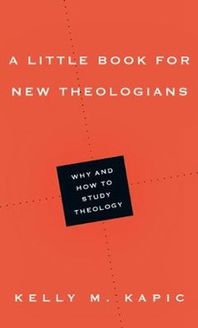posts
|
This is a big little book--a must read for students beginning theological or seminary studies. In 10 chapters (easily read in one sitting each) and just over 100 pages, Kelly Kapic winsomely integrates the heart of theology with the how of it. This is timely because as often fragmented people, we fragment things like studying doctrine, worship, and sacrificial Christian service when they were never meant to be disintegrated. Built from his doctrine 101 course at Covenant College, the author wonderfully makes his case for a lived, worshipping theology by including the likes of Origen, Cyprian, Augustine, Gregory Nazianzen, Anselm, Luther, Calvin, Kierkegaard, Barth, Lewis in the conversation. After making the case for the why of theology in the first 4 chapters, Kapic takes the final 6 to discuss the characteristics of a theologian: one committed to faithful reason; prayer and study; humility and repentance; suffering, justice, and knowing God; tradition and community; and a love of Scripture. Given this overview, I'll comment on several things that I found especially helpful.
Theology is a pilgrimage. Christians focus on their "walk" as members of "the Way" (p. 32). As John Owen points outs, we like Moses want to see God but "we see only his back parts" (p. 35). That is, our theological understanding is limited at best. Kapic adds that "The praise offered now comes from those laden with anxiety, while in heaven all are free from concern; here there is hope, in glory 'hope is realized'" (p. 33). With this future hope in mind, we continue to worship God, ponder His ways, and grow and develop and occasionally change our minds during our theological journey. Faithful reason. Kapic helpfully writes, "In theology, reason rightly works in the service of faith; and because of this, faithful theology does not despise rational reflection" (p. 52). Following in the Augustinian tradition of faith seeking understanding, Kapic argues that faith should proceed reason; but yet the two work together toward a clear understanding of theology. Seeing doxology as the end of theology, he concludes chapter 5, "it becomes impossible to imagine theology that is not hungering and thirsting for communion with God" (p. 63). Prayer and study. Continuing Anselm's tradition of forging theological discourse in the form of a prayer, Kapic adds that "prayer makes faithful theology possible" (p. 67). He continues, "Here we speak not merely of times set apart when we fold hands and bow heads, but also a way of being" (pp. 66-67). That is, a theologian is always in the presence of God and in constant conversation with God even while also using the mind to articulate theology. Humility and Justice. In chapters 7 and 8, Kapic argues that the study of theology ought to produce humility in the theologian before God and others. If not, then there is a clear theological-spiritual problem. Related, true theology demands action--the practice of living out the Christian faith in the world and connecting with the "weak, hurting, and lonely" (p. 90). He concludes chapter 8 asserting we should allow "the call for sacrificial action to reshape our theology" (p. 92). Scripture. In the final chapter, Kapic concludes, "good, orthodox, and worship-inducing theology must be rooted in, sustained by and continually nourished through Scripture" (p. 107). The author appropriately concludes the book by offering a definition of theology: "an active response to the revelation of God in Jesus Christ, whereby the believer, in the power of the Holy Spirit, subordinate to the testimonies of the prophets and apostles as recorded in the Scriptures and in communion with the saints, wrestles with and rests in the mysteries of God, His work, and His world" (p. 121). So let us wrestle and rest as we do theology. Comments are closed.
|
Archives
November 2023
|

 RSS Feed
RSS Feed
